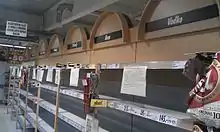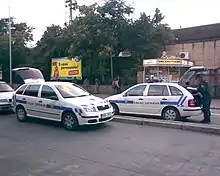2012 Czech Republic methanol poisonings
The 2012 Czech Republic methanol poisonings occurred in September 2012 in the Czech Republic, Poland and Slovakia.[1] In the course of several days, 38 people in the Czech Republic[2] and 4 people in Poland died as a result of methanol poisoning and many others were taken to hospital.[3][4] The poisonings continued for several years after the main wave. As of April 2014, there were 51 dead and many others suffered permanent health damage.[5]


The Czech government established a central emergency response council and banned the sale of liquors with more than 30% alcohol by volume at food stands on 12 September.[6] On 14 September, the ban was extended to any sale of all alcoholic beverages with an alcohol content above 20% vol.[7] On 20 September, export of such products was banned as well.[8] The restrictions on liquor sales were lifted on 27 September 2012.[9]
The police systematically checked shops where liquors were on sale. Led by police vice president Václav Kučera, a special police team called Metyl coordinated the investigations.[10] On 24 September, the police announced that the source of the methanol-contaminated alcohol had been identified. Two main suspects were arrested: Rudolf Fian, a businessman from Karviná of Slovak nationality, and Tomáš Křepela, a Czech company owner from Řitka. On 21 May, 2014, the two were sentenced to life imprisonment; eight others to imprisonment for 8 to 21 years.[11][12]
Similar incidents in the past
A similar incident, the Pärnu methanol poisoning incident, occurred in Pärnu county, Estonia, in September 2001, when 68 people died and 43 were left disabled after contents of stolen methanol canisters were used in production of bootleg liquor.
Film
Česká televize produced 2018 film Metanol. The film focuses on the distributors of the toxic alcohol and aftermath of the poisonings. The second part focuses on investigation and eventual trial of perpetrators.[13]
References
- "Pierwsze przypadki zatrucia metanolem na Słowacji" (in Polish). dziennik.pl. 17 September 2012. Retrieved 17 September 2012.
- "S otravou metylalkoholem bojoval v nemocnici měsíc, nakonec zemřel" (in Czech). novinky.cz. 12 November 2012. Retrieved 12 November 2012.
- "Metanol má 21. oběť, zemřela žena z Českého Těšína" (in Czech). Novinky.cz. 17 September 2012. Retrieved 17 September 2012.
- "Cztery śmiertelne zatrucia metanolem w Polsce. Dwa przez czeski alkohol?" (in Polish). TVN24.pl. 17 September 2012. Retrieved 17 September 2012.
- Koledník přestával vidět, s podezřením na metanol skončil v nemocnici
- Kopecký, Josef (12 September 2012). "Stánkaři nesmí prodávat rozlévaný tvrdý alkohol, rozhodla vláda". iDNES.cz. Retrieved 24 September 2012.
- Hovet, Jason; Mlcochova, Jana (14 September 2012). "Czechs ban spirits sales after bootleg booze kills 19". Reuters. Retrieved 17 September 2012.
- Smísal, Matěj (20 September 2012). "Z Česka se nesmí dostat ani kapka alkoholu. Ministr zdravotnictví zakázal jeho vývoz" (in Czech). iHned.cz. Retrieved 21 September 2012.
- "Prohibice končí, hospodští ale většinou nemají co nalévat". deník.cz. Retrieved 30 November 2012.
- Velinger, Jan (12 September 2012). "Special police team created". Radio Prague. Archived from the original on 15 October 2012. Retrieved 17 September 2012.
- "Šuškalo se o něm leccos, říkají o hlavním obviněném v kauze metanol" (in Czech). Novinky.cz. 26 September 2012. Retrieved 7 October 2012.
- "Za metanolovou smrt padly doživotní tresty pro dva hlavní míchače". Mladá fronta DNES. iDNES. 21 May 2014. Retrieved 22 May 2014.
- "Film Metanol. Chtěl dům a chtěl bazén, tak zemřelo 48 lidí". Novinky.cz (in Czech). Retrieved 29 April 2018.